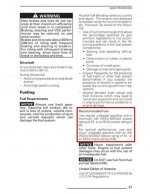Bill -- while gasoline is a fraction (by weight) of the fuel our engines combust, it is the fraction that we can exercise the most quality and price control over. Because our Rotax engines essentially protect themselves, your choice should be guided by the same methods used for other consumables (eg, lettuce, beer, toilet paper, etc). They are, in no particular order:
1. Trustworthiness of the supplier
2. Price you are willing or able to pay
3. Rate of consumption including vehicle storage conditions (gasoline gets old just like lettuce does) which may call for additives
4. Driving conditions (vehicle gross weight, speed, terrain, temperature/humidity)
Generally #4 is the most concern for octane selection. If you are running your Spyder with heavy loads (2-up, trailer); above posted speeds; repeated hills and mountains; and in high temperatures with low humidity then a higher octane gasoline should be used.
And that's as far as I'm going to walk on this plank.:doorag:

